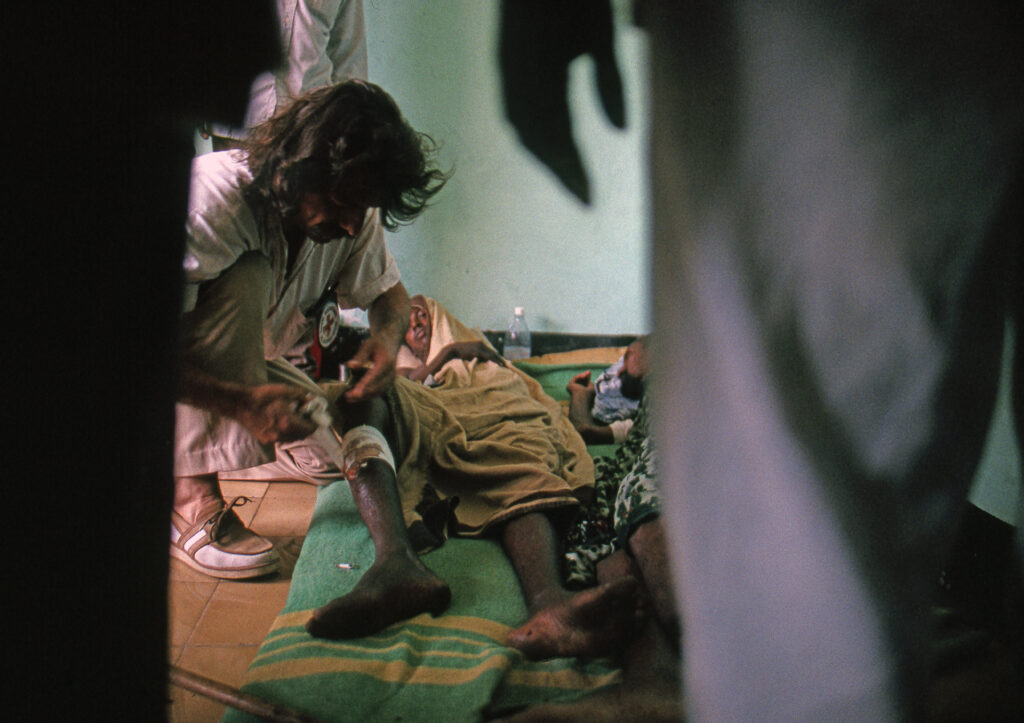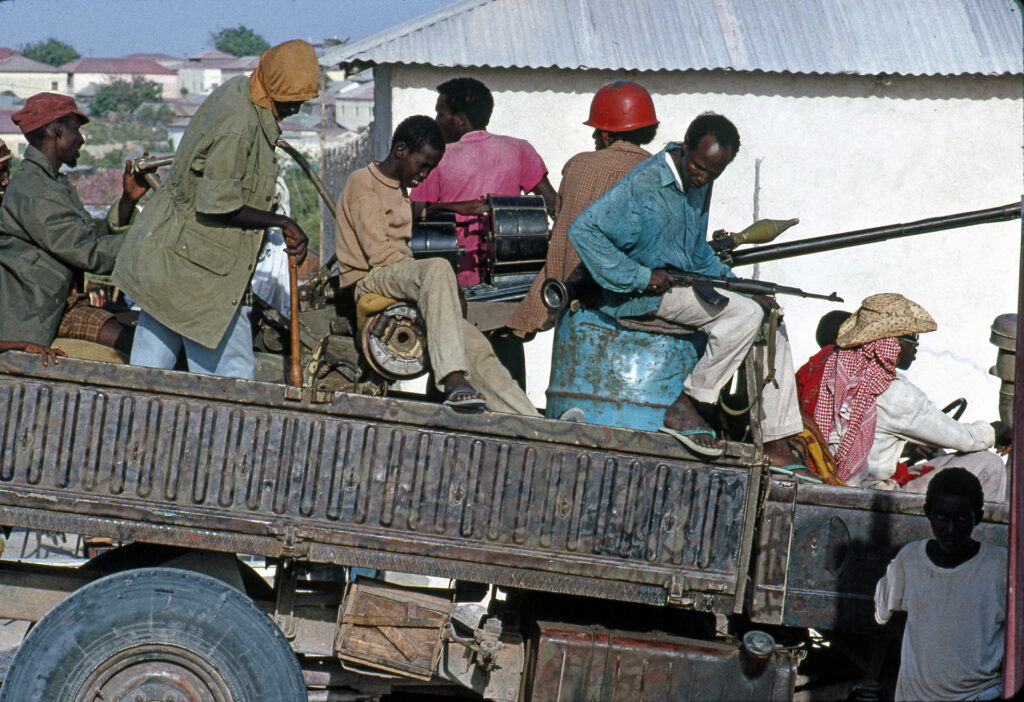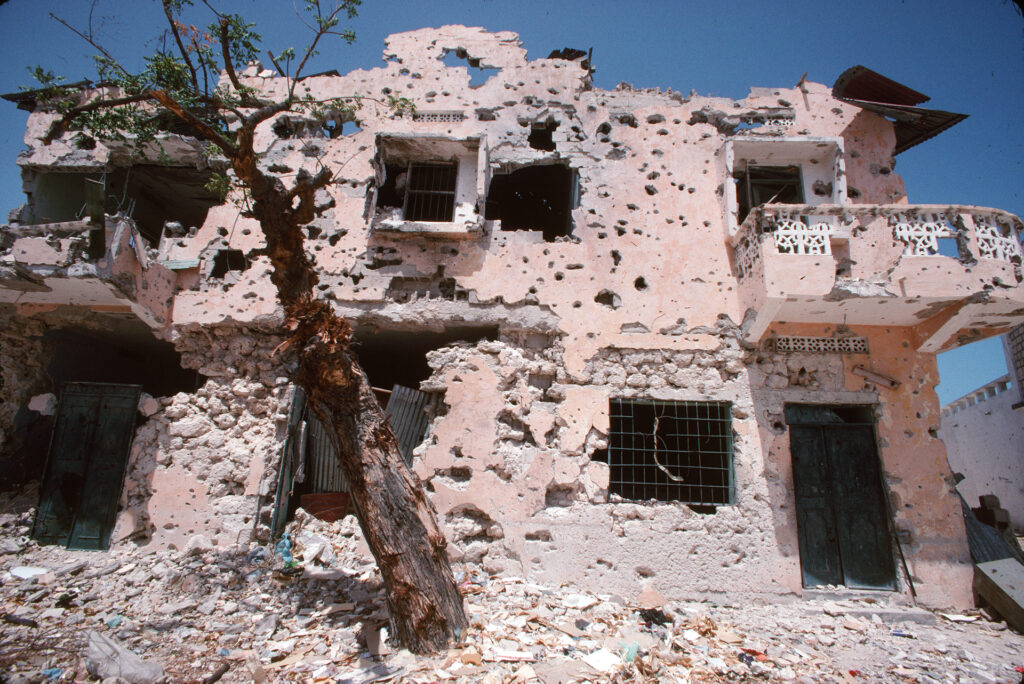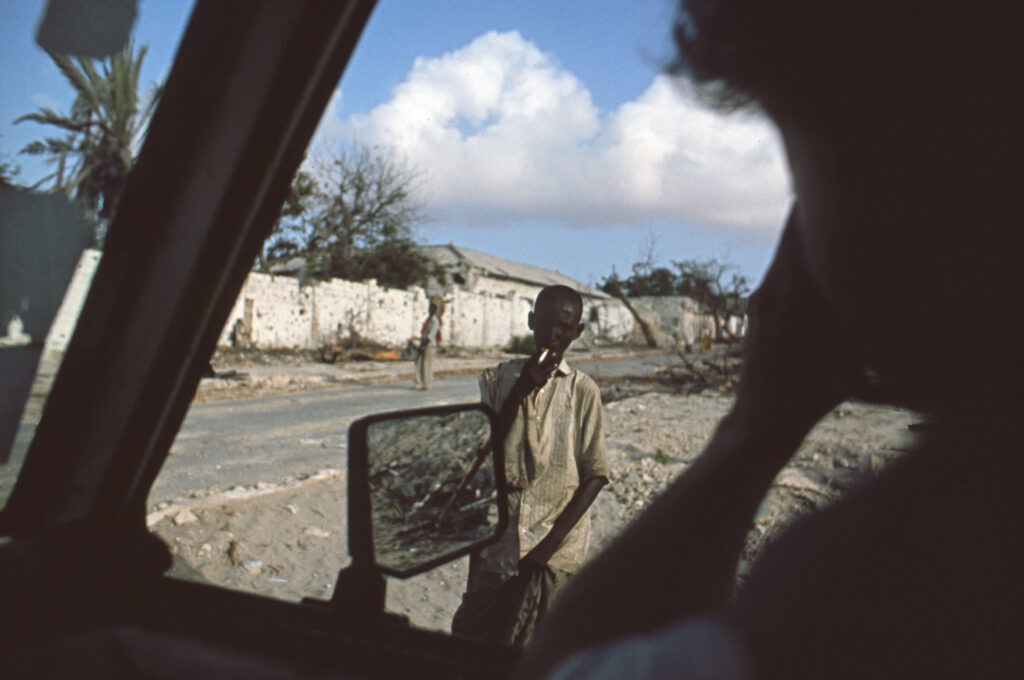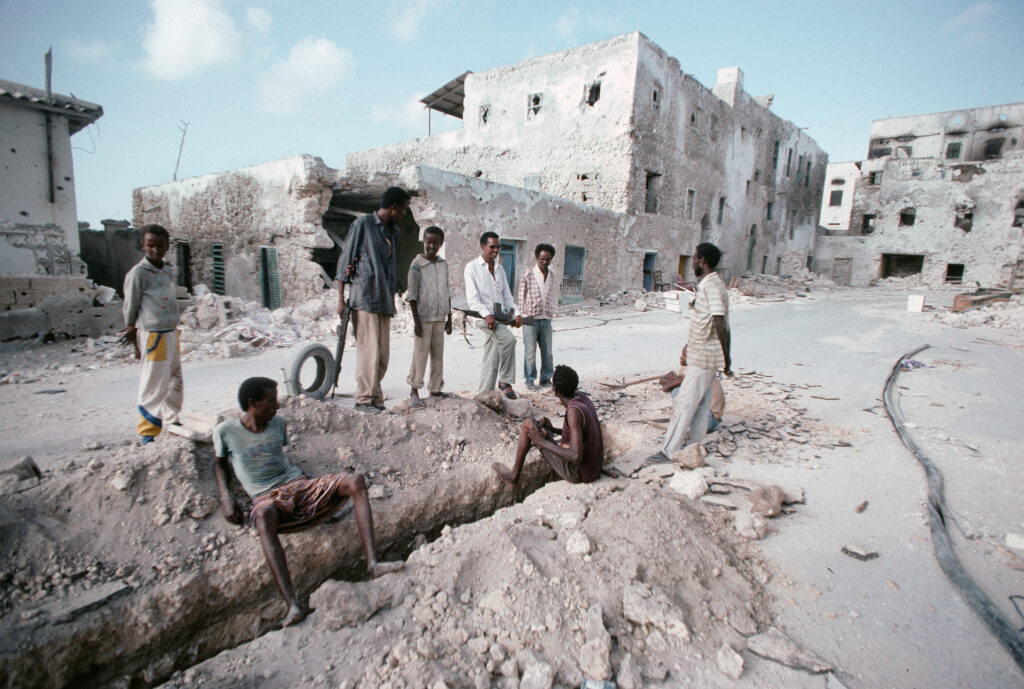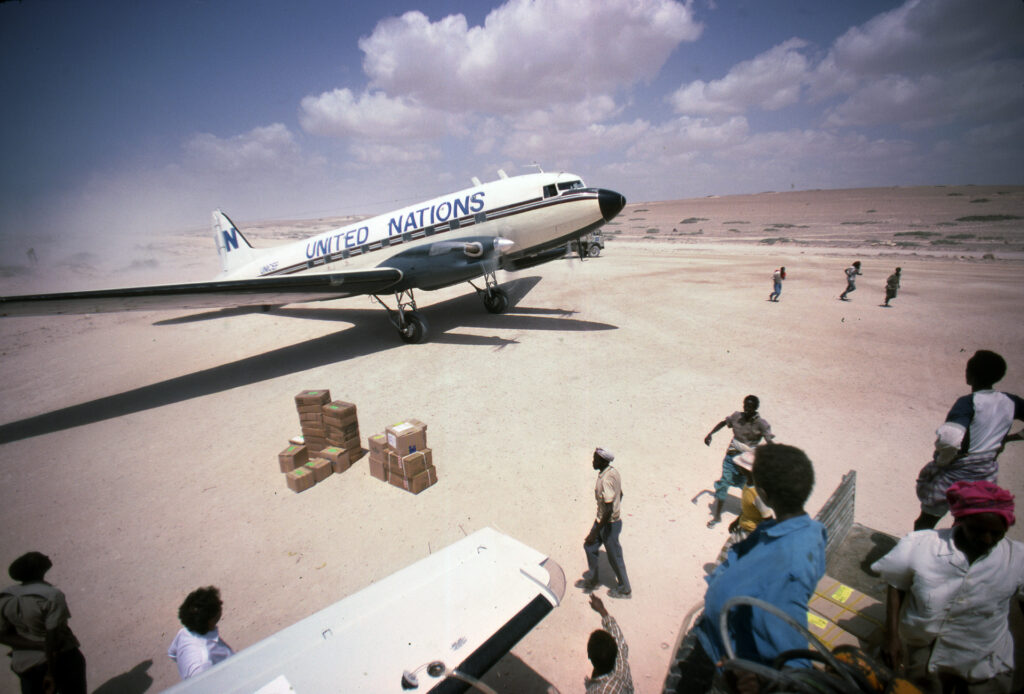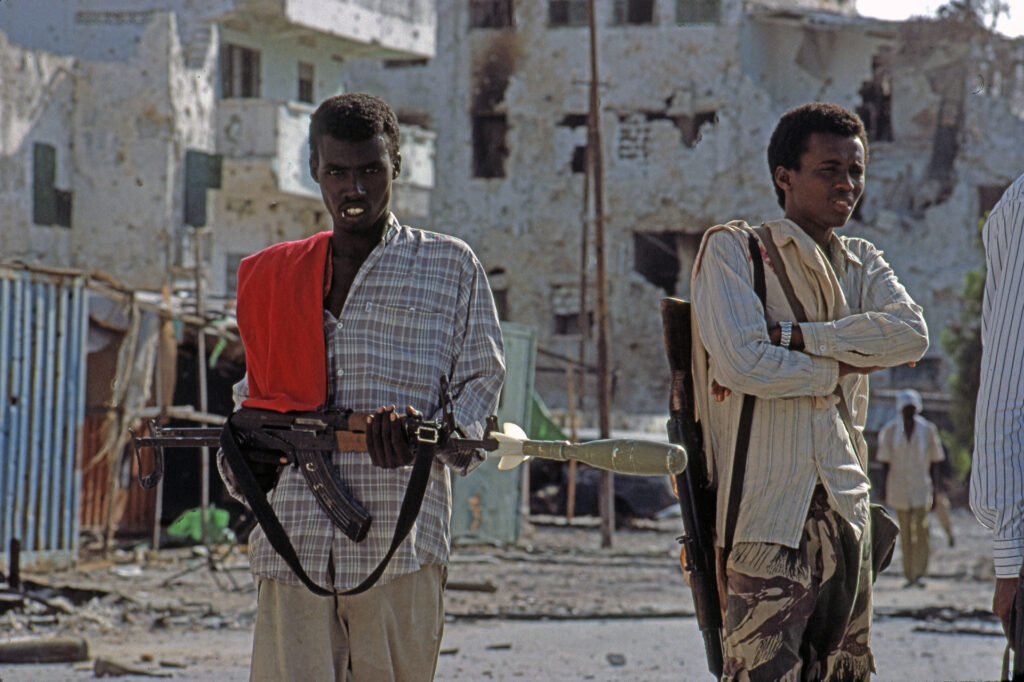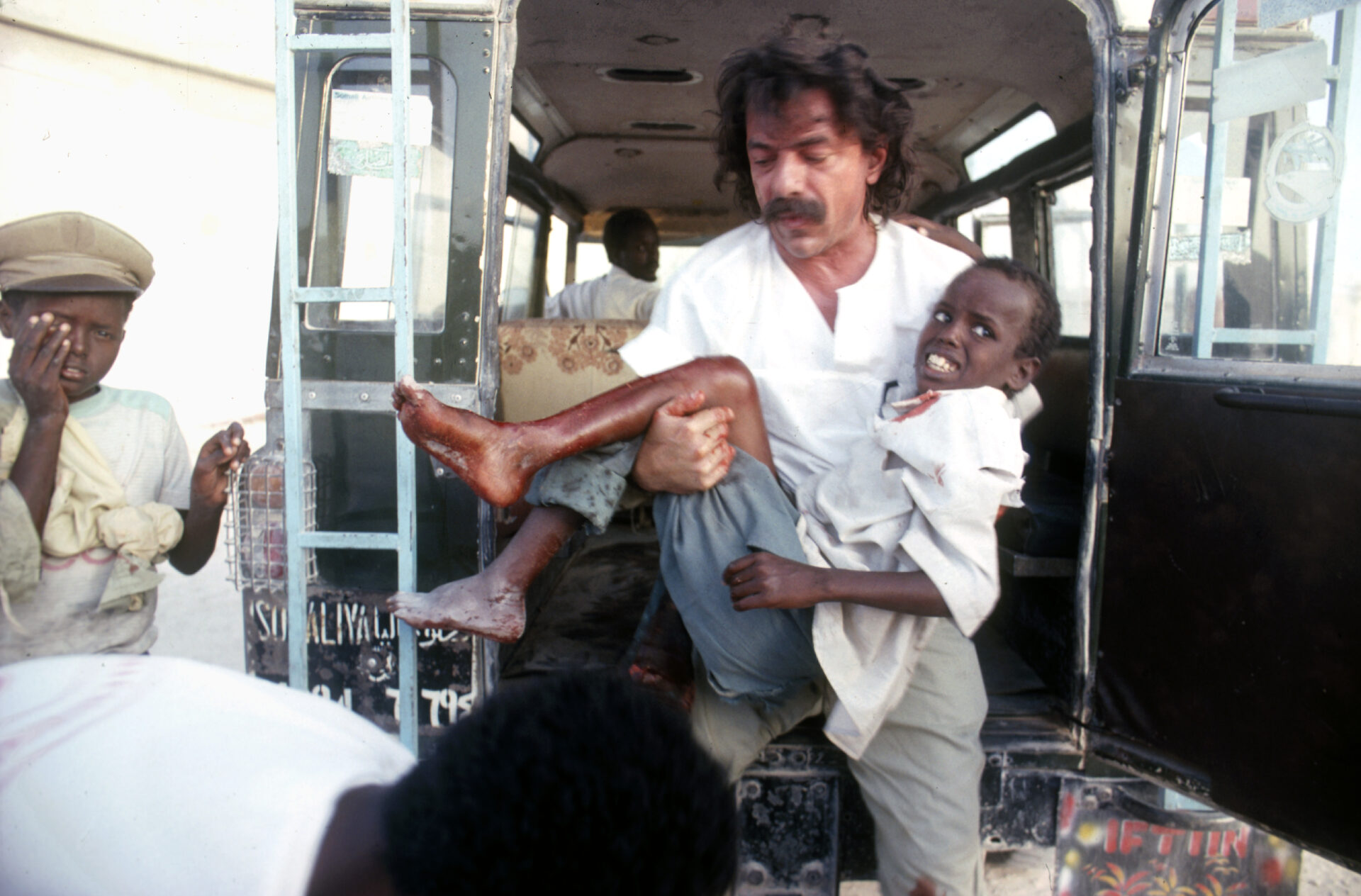Doctor of Conscience: A War Surgeon in Somalia
There is an explosion, very close. It comes from the furor in the middle of the road. Dr. Chris Giannou is the first to recognize the sharp crack and acrid smell of a detonated cordite grenade. When it explodes, he just happens to be only 50 meters away inside a Red Cross-flagged Landrover leaving the guarded gate to the headquarters of the International Committee of the Red Cross (ICRC) in north Mogadishu, Somalia’s war devastated capital city. Chris Giannou is one of the world’s most experienced war surgeons and this is the beginning of his third mission for the Canadian Red Cross.
He leans over the back seat of the landrover intently scrutinizing the commotion for a wary moment before instructing the driver to move the vehicle to where a young boy curls in pain, fear and blood in the middle of the road. An old man kneels and holds his pierced eyes and bleeding head. People wail, moan, shout, run; some stand stunned. It’s impossible to know exactly what is happening or might happen. Who and where are the perpetrators? Who are the victims? Who is injured and who is only bloody? In seconds, Chris identifies and loads three wounded in the back of the Red-Cross Landrover. Men from our two armed security escort vehicles follow his abrupt orders and load more of the wounded in their trucks. In a convoy we speed out of Mogadishu towards Kasani Hospital, seven kilometers away. Fifteen people are injured and one is dead.
In the back of the Landrover, armed with scissors and flashlight, Chris cuts away bloody clothes, dispassionately assessing the injuries of his new charges. Apparently children were playing with a grenade that one five-year-old had found at home. Chris maintains that accidents and stray bullets in war zones are more dangerous than shelling. He sneers with disgust at the wasteful carelessness. The boy we saw first in the street stares in bewilderment at his dangling ripped foot, at the place where his ankle used to be. Holes puncture both legs and a piece of flesh is missing from one arm. There are no tears in his eyes, only disbelief. The old man’s eyes are closed. “Press here”, Chris says, “there is a wound underneath.” It throbs as I press a soggy shred of my towel on the mans bloody neck. Horns blare and we bounce on the dusty road past a lime quarry obscured by drifted sand, abandoned except for hungry dogs waiting and foraging for food in the sweltering sun. We race through two security roadblocks and into view of Kasani hospital set against the Indian Ocean.
Intended to be a prison, Kasani has four long solid white walls and a huge metal gate that isolate it from the blowing randomness of the coastal desert. It is the only hospital in north Mogadishu, and a veritable fortress of order and relief in a land of chaos. To a nomad, home is where you sleep. Chris explains that because it is important for the ICRC to be present on both sides of Mogadishu for reasons of neutrality. We must stay here tonight. The ICRC has been absent from north Mogadishu for two weeks since six delegates were forced at gunpoint to evacuate the hospital during an attack by one of two rival subclans that have savagely bombarded each other in a vicious struggle for territory. The meter-wide holes blown through the front wall of Kasani are from General Aidid’s tank artillery. Several hundred died or were wounded in the battle. Spent shell casings litter the road, and the hollow hulks of two Russian tanks lie destroyed and scavenged, like most of Somalia.
From the high walls surrounding Kasani, fly seven Red Cross and Red Crescent flags, but they are not protection enough in Somalia. At the gate four guards armed with Russian Kalashnakovs and American M-16 machine guns identify us before opening it. Never in the ICRCs’ history have they needed more security than in Somalia. Forty-three heavily armed men secure Kasani, like hired armed men protect every ICRC and foreign aid vehicle, villa and worker in Somalia. The United Nations calls Somalia the worst country in the world for human suffering. Mogadishu remains desolated and severed in two, and anarchy still reigns in the rest of the country. Before the civil war 1.5 million people worked in Mogadishu, now 400,000 souls barely survive there, and only 2000 have jobs – all with foreign relief agencies. Before the United Nations arrived, two million people faced the whip of starvation amidst a drought they say was the worst in living memory. Agricultural production is down eighty-percent. Farmers are either afraid to re-plant looted crops, or they eat their seeds. Livestock is dying. Camel meat costs little more than water, but very few have money. Food is better than currency. In a refugee camp in Kisimayo, a withered young women with two dying children tells me she is afraid to accept food because “the people with guns come and kill us for it.” Chris’ solution is to “fly over Somalia with B-52’s and carpet bomb the country with food.” You have to make it worth nothing,” he says, “Having a truck load of food is like having a truck load of gold.” “
About all that flourishes in such a land is desperation. In the streets of Mogadishu, a young boy tried to sell me a human skull, a grisly memento which no doubt came from one of the countless shallow, sandy graves that pepper the city. On the top of the list of dangerous people in Somalia are the ones who have nothing left to lose, most notably the angry, demanding and armed men in wheelchairs or on crutches.
These are the circumstances that unleash Dr. Chris Giannous’ charged forte. “I’ll go wherever they send me,” he says, but Yvette Diepenbrock of the Canadian Red Cross in Ottawa says “Chris sets his own agenda.” He can appear hard and cold, and sound even dispassionate in his directness. But he has devoted the last 14 years to serving humanity in the hell holes of the world, and has risked his life to save others. Practicing medicine is a vocation not an occupation to him. As a war surgeon and expert organizer of hospitals and operating theatres in battle zones, he is the Director of Surgical Operations for the International Committee of the Red Cross in Somalia. His mission is to do whatever he can to treat war wounded as quickly as possible, and from what I saw from spending more than six weeks with him in Somalia, his task of bringing order to chaos is an almost impossible one. Peter Stocker, Head of the ICRC operations for all of Somalia says, “We don’t work here; we do the best we can.” Chris’ agenda in Somalia is as erratic and unpredictable as Somalia itself. On several occasions we crossed the battle front dividing the two Mogadishus’ to assess hospitals in south Mogadishu. And with unscheduled plans, I followed “The Flying of Doctor of Somalia,” as he is referred to, on more than a dozen flights to as many hospitals.
I first heard about Chris’ reputation in Cambodia where, a few months before coming to Somalia, he completed a year-long mission for the Canadian Red Cross in the middle of Kymer Rouge country in a bloody little town called Mogel Borei. Another place in a long litany of war zones where, according to Dr. Pauline Cutting, a colleague who worked and starved with him during the siege of Shatila in Beirut, “he does what he does better than anyone I know, or anyone I have ever heard of”.
He survived ten years of battles and evacuations in Lebanon including the horror of Shatila, where 3500 Palestinian refugees defended a camp barely the size of a city block for twenty-seven relentless months. He created and maintained their hospital and operating theatre while artillery, tanks and sniper fire from Lebanese Shii’ite Amal militia reduced 90% of the isolated camp to rubble. In the face of starvation he performed surgery in an underground operating theatre, sometimes on the floor, often as walls cracked around him from artillery and mortar fire. Before it was over they buried 110 people but saved 650 critically wounded. Resistance was all that was left for him, for everybody defending Shatila. It was the alternative to dying. Yet even with opportunities to leave, he refused. Shatila was his family. “Home is a moral boundary, not a physical space,” he says. He was as much a Palestinian as anybody in Shatila, and he gave no value to the privilege of having a Canadian passport. His inspiriting humanitarian work earned him the Order of Canada, the Vilan Award from the Montreal Rotary Club, and a plaque from the Canadian Arab Federation.
Chris Giannou’s history makes a good case for destiny. He was born in Toronto in 1949 to Macedonian Greek immigrants. His parents had accents. His father was a lawyer in Greece but a language barrier made it too difficult for him to practice in Canada, so he reluctantly opened a restaurant. Chris grew up feeling disenfranchised from what he calls the hypocrisy of Toronto Anglo Saxon bourgeois elitist values. He recognized poverty and racism at a very early age not only in Toronto but also on trips with his father to northern Greece. As a young boy he wondered why some people have so much, too much, and why some people have so little, too little. His anger towards inequality fueled a tenacity that made him excel in everything he did. Macedonian Greek was his first language, but he was determined to speak English better than the English so he read dictionaries and encyclopedias, and when he wasn’t studying or playing football or his flute, he took advantage of his season tickets to plays at an old theatre in Toronto. During his high school days, the money he made waiting tables at a greasy spoon hamburger joint, he spent on books. A friend told him about an entrance exam to the semi-private University Toronto School. Without his parents’ knowledge Chris wrote the exam and won a scholarship. He was a short but clever kid enthralled with world politics. He knew the implications of the existence of American military advisors in Vietnam years before his classmates even heard of Vietnam. And he probably would have gone to Greece in the late 1960’s to see first hand the civil turmoil that was boiling there had his parents and school teachers not convinced him otherwise.
Among his heroes were Albert Schweitzer, Norman Bethune, and Ernesto Che Cuevara, and his father and grandfather nurtured him in the dynamics of materialism, socialism and communism. They shared a compassion for humanity not dollars or prestige. His sister Mary Janitos says she fought with him a lot because he got most of the attention in the family. “He was a very inquisitive boy and once made me hold a glass shampoobottle so he could heat it up to see what would happen. It exploded and cut our faces,” she recalls. “I think he always wanted to be a doctor. I remember him learning the names of body parts from a translucent plastic human anatomy kit he had in his room when he was in grade school.” From high school Chris enrolled at McGill University, but after a year, in 1968, he was given a choice between failing or leaving on account of a protest he participated in over a censorship issue and the school newspaper. Disillusioned he packed his bags and flung himself into the third world in search of something more genuine and meaningful, and he never really returned to life in Canada. He chose Mali, because it was high on the list of underdeveloped countries. He talked his way into the Malian civil service and a job teaching English and mathematics to poor and oppressed. He instinctively related to their struggles, but was particularly moved by their unfailing dignity in the face of political and social condemnation. He found the comraderie he never had in Toronto. He also landed in a third world hospital near death from malaria and hepatitis, and talked to Malian doctors frustrated by the disadvantages of having trained in France only to practice in Mali. From listening to their complaints Chris concluded that if he was to be a doctor in the third world, he would train commensurately. He went to Algeria and enrolled in medical school, but after two years his good intentions didn’t include falling in love with a Moslem women where marriage is forbidden to non-Moslems. In 1971 Saida and him moved to Cairo and got married, and over the next nine years Chris became fluent in Arabic and secured his eclectic medical and surgical education from Cairo University and the National Cancer Institute. Armed with a Masters of Surgery degree, and an unwavering disdain for injustice, he and Saida moved to Lebanon, but after two years they parted. With no family Chris was free to put all his energy into helping the Palestinian refugees in Beirut. He was committed, and still is, to the ideological correctness of the issue. Although, as Rich Salutin an author friend of Chris’ living in Toronto says, “Chris is committed and willing to die for someone’s revolution, but don’t make him listen to all the rhetorical revolutionary bullshit.” When the Israeli army invaded Lebanon in 1982, the hospital Chris directed was closed and Chris was imprisoned for two weeks. An experience that added fuel to his blazing humanitarian values. For a time he was a member of the PLO, and for the next eight years he worked for the Palestinian Red Crescent Society, mostly in Beirut with a few short missions to Cuba, Nicaragua and North Yemen. By 1990 his accomplishments and experience surpassed any reservations the Canadian Red Cross may have had over his political astuteness and gave him his first mission that took him to Berbera in northern Somalia, and another in 1991 sent him to Cambodia.
Chris Giannou is uncompromising about his responsibilities to humanity. And for a war surgeon there are few places where responsibility for human life weigh heavier than in triage. This is the large white tent inside the first wall and secured from the rest of Kasani hospital by another gate, and where war wounded are prioritized for surgery. Chris scrambles out of the landrover with a boy in his arms and into triage. Blood, from torn bodies on stretchers side by side in two rows, smears the concrete floor. Assessing the severity of wounds is critical in war where casualties typically out-number operating tables. “Sometimes it’s a matter of who to spend time on and who to let die. You always put your most experienced surgeon in the triage,” Chris says. In the crowded frenzy of the tent, he flings his arms in the air and with penetrating eyes and a frozen stance he shouts loudly “everybody stop.” Silence cuts the chaos and emphatically he tells the inexperienced Somalia Red Crescent volunteers to strip the patients and start intravenous lines. In the absence of equipment, Chris uses cardboard to splint a wounded leg. He moves quickly from patient to patient, feeling and prodding their limbs, looking into frightened eyes and ripped flesh and scribbling his diagnosis along with a priority number on scraps of cardboard which he leaves on each stretcher. His motions exude confidence and are as articulate as his vocabulary. It’s obvious to me that being a humanitarian, heart and soul, doesn’t preclude being something akin to unpleasant in his intolerance of rhetoric and the unscientific. It’s evident that he is the one with the experience here. He knows it and everybody around him pays attention. With his gruff abrupt and unintimidated manner he soothes the frenzy into orderly calmness. A calmness that comes from having looked death in the face for a long time. In his last act before exiting the triage he barks out a cutting order for everyone except the staff and the patients to get out of the tent. He doesn’t have to ask twice. That night, after spending six hours performing three operations, including one that saves the leg of the boy injured by the grenade, he shares his expensive scotch with me. Chris Giannou can expatiate on endless topics including Greek Philosophy, the Koran, creation myths, jazz and movies. There is romance and adventure in his voice as he passionately exudes more than the movie “Mountains of the Moon”, reveals about the adventurer Richard Burton and his search for the source of Nile River. It is early morning before Chris retires to a simple cot in a tiny concrete room – one in a row of cells that were originally constructed to be the solitary confinement section of Kasani.
As my days with Giannou turn to weeks, I find myself thinking of him as a tough desert nomad seasoned with drought. He has no home address, few possesssions and , apparently, few material needs or wants. He considers all eventualities. ” I plan for the worst and hope it never happens,” he says. “What if hell should break loose again,” he says about the eleventh, very tenuous, one-day old, United Nations-brokered ceasefire. He tries to understand the irrationality of an incredibly complex power based myriad of unstable tribal relationships, in order to second guess where the next fighting might break out. All Somali’s belong to a vendetta-laced mosaic of clans and subclans with shifting alliances who have known tribal feuding for centuries. Over dinner one night in the relative luxury of an ICRC-rented villa in south Mogadishu, Chris clarifies the complexity of this country with a quotation from a familiar Somalia proverb, “I and Somalia against the world. I and my clan against Somalia. I and my family against the clan. I and my brother against the family. I against my brother.” On another occasion he graphically demonstrated his own thoughts about Somalia’s situation in front of a group of doctors by holding a piece of paper in front them, then ripping it to shreds. “Somalia is not one country but many,” he said. He couples varying regional predicaments with the capabilities of each hospitals’ staff and then reports and makes recommendations about how the ICRC can be most effective in circumstances that many Somali’s told me they don’t even understand. At night he types out the day’s observations on his ever present Toshiba lap-top computer, that he carries in a black bag.
In Karen, a district in south Mogadishu, over 3500 wounded lie in their own filth, swaddled in rags and dirty dressings, in twenty-seven looted villas. Chris decides to vacant one villa, move the patients to Kasani, and transform the building into an functioning hospital. Besides ordering surgical supplies and equipment for Karen hospital, he discusses and inspects the entire renovation including the water well, plumbing and floor plan details, generator capacities and electrical consumption and fluorescent tube sizes – right down to staff working schedules, security at the entrance, and hospital protocol. “When nervous and demanding people with guns bring in their wounded, get an intravenous line going in the patient’s arm…I find that calms his friends down,” Chris advises the new triage nurse.
Whether he’s organizing surgical facilities or performing operations, Chris Giannou is a perpetual fountain of strategies and unreserved advice. Rich Salutin, a writer friend of Chris’ living in Toronto says, “Chris’ passion for politics is only equalled by his passion for surgery. He can talk endlessly on both topics, yet he’s very informed, never light-headed about any of it. He’s one of the smartest people I know when it comes to politics. Surgery and politics is a wonderful combination, maybe because the reality of surgery keeps him honest.” During one of many operations he performed, Chris shows Somali doctors how to give the patient back his own blood a technique called “autotransfusion,” where blood that is uncontaminated because it comes from the patients thorax is recovered and injected intravenously back into the same patient. To ward nurses he suggests using infusion bags refilled with water or sand for weight, when traction is required, and he insists that local craftsmen make beds, mattresses, IV stands, and lamps that can run on car batteries. “For surgical gowns” he says “buy material and start a sewing shop in the hospital.” He chooses the material, a flowery pattern, figures out the sizes and the quantity, and gives instructions on how he wants them sewn. In one of many meetings he explains why a centralized blood bank is not appropriate for fragmented Somalia, and he talks ardently about the advantages of using recyclable glass bottles. He advocates using wood-fired pressure-cooker type autoclaves because they don’t rely on generators and tenuous fuel supplies.He makes inventories of hospital equipment and pharmaceuticals, and suggestions for recording statistics. And he is always separating facts from exaggerations. At Karen hospital, for example, he’s told 800 people should get food for work, and when he asks for their names, the number goes down to 160.
If it’s painful and it doesn’t work, amputate it,” says Chris while three Somali doctors watch him examine an anguished boy who has been lying for twelve months on a stained mattress on the concrete floor of a looted hospital on the outskirts of Garoe, a small xenophobic desert town in central Somalia. The boys leg is gangrenous from an unhealed bullet hole that lets me see through his knee. Another patient holds up his own crushed left hand in excruciating pain. “He has a useless painful hand.” We will do amputation,” Chris barks. He speaks mostly in Arabic to the patients. Partly out of pride and fear and partly because they are being fed here and have nowhere else to go, these boys have refused amputations and suffered long. Chris changes their minds. “If you don’t want amputation, then you are discharged, there is nothing more we can do for you.” He’s dramatic and animated and throws his hands up as if to say “these are the facts.” Because hospitals are one of the safer places to be in Somalia, doctors have difficulties discharging patients. Time after time Chris impressed upon Somali doctors that “hospitals are not hotels.” Benadir, Medina and Sygfer hospitals in south Mogadishu are like refugee camps, their courtyards swarm with makeshift shelters and people line up for water. Drugs and food rations are stolen from patients. Stock piling anything of value immediately creates a security problem. Looting is a way of life.
“There is nothing like war for private enterprise.” Chris says, “One of war’s secrets is that if you have money there is lots to buy.” One big problem is feeding hospital staff and patients. There is no shortage of work for doctors, but many have fled, and others are tempted to bootleg hospital medicines for cash. Of the remaining doctors few are specialists – no anesthesiologists; many are young graduates, or students, with no war surgery experience, and most haven’t been paid in over a year. They work for seventeen kilograms of rice, lentils, and oil per month, but there is never enough. In determining their rations, Chris is adamant when he says “No Work – No Food. In Garoe, he negotiates with five doctors who fled from Mogadishu and persuades them to remain and work at the hospital in return for food, fuel and housing.
Gunshots are heard everyday. “Security,” Chris says, “is always the number one priority,” and “security incidents” have to be expected. ICRC delegates and staff have been killed in Somalia. Three Somali drivers were shot in one week. Everyone is vulnerable outside the walled and guarded confines of ICRC operations. No one goes anywhere without a walkie-talkie. Walking is rarely done, never at night.
Chris defuses a “situation” before it becomes an “incident” on the tarmac of the north Mogadishu airport where armed men with pointed guns refuse to let us leave through the airport gate. First the airplane loaders want twice the money they agreed to. Failing that, they say they have wounded comrades and demand the medicines that came on the airplane we just arrived on. Chris steps into the tricky debate and says, “I am a doctor.” “These medicines might not be good for your wounded people.” He offers to go and examine their friends. They agree and seem particularly flattered and impressed by his fluent Arabic. We jump back into our vehicles and are guided to a nearby abandoned and looted villa where nineteen men with burns and gunshots lie on the floor. He examines them. His caring is obvious, and they accept his offer of a box of dressings and a bottle of ampicillin tablets. A small price considering they could easily have shot us and just taken what they wanted.
On another occasion, diplomacy wouldn’t have worked. A “crazy man” in Kisimayo walks up to the open windows of our vehicle, a grenade in hand. Fortunately he’s instantly disarmed by our body guards and dragged away ranting and raving. Who knows what is going through his mind – perhaps he has heard the rumour about the ICRC stealing food and getting rich, or the one about the “foreign doctors”, who practice unnecessary amputations and sell human organs in Europe.
One morning I returned to the ICRC villa in south Mogadishu swearing and shaken after having gone with three of General Aidids’ men into central Mogadishu where our car was shot at. Chris and the ICRC staff were finishing breakfast. They joked and told me – “It’s good you’re alive.” It’s easy to laugh in Somalia at all the situations where one could have been killed because there are too many situations when people in fact are killed. Dr. Mina, a smiling Somali women who is the Director of Kasani hospital excitedly tells Chris and me how happy she is to see an old colleague who she thought was killed months ago. “It’s so nice he’s still alive,” she says. Chris turns to me and says. “It gives a new meaning to the word nice.”
All other images of war wounded vanish in the smell of raw flesh, blood, feces, and gaseous gangrene. Unimaginable mutilations are commonplace to war surgeons. Chris shoves his index finger deep into a hole in a mans chest, then two fingers. He winces and strains, perspires profusely, and pulls out a bone fragment hung with dark clotted blood. X-ray machines are a luxury in Somalia. Damage is assessed visually or simply by feel. “That was liver hanging out of that man,” he tells me casually. On another operating table a boy sits dazed with his head slunk low, holding a dish under his bleeding and gaping jaw. On one side of his cheek is a small hole and on the other, where the bullet came out, is a ragged big hole. He’s lucky he still has his tongue,” Chris says as he begins the two hours it will take to cut, drill and wire the boys mouth and jaw together.
He shows doctors in the Garoe hospital how to organize the few instruments they have in their operating theatre. “In Shatila it was much worse;” Chris says, “at times I operated on the floor and sterilized my instruments by burning alcohol off them.” The untrained anesthetist shouts at curious onlookers outside the open window. Chris rummages through a cardboard box, untangling a mess of surgical instruments. “There is a jiggly ( bone saw) in here?” he asks rhetorically with an arabic accent.- “Today we make amputation!” “We look for suture material, I want more number 20.” He talks voluminously with excited eyes and without hesitation and switches between Arabic and English. “We will not close muscle or skin, lymphatics are full of bacteria, we need to drain. After five days, if it is clean, we will close and put in drain. What do you use for drain? You can use a glove or you can use tube from infusion.. Two drains, one inside the muscle and one inside the skin.” He throws boxes on the floor. “See this, everything should be open so you can see what you have… This, I don’t know why you have it here, this is for drinking water,” he barks while displaying a glass jar. Chris and two Somali doctors operate on a table partially held up by a concrete building block, under light from open the window and a flashlight. Chris is loud and abrupt and in charge. “You doctor, you don’t watch the operation; you watch the respiration.” “Clamps, clamps, NO, clamps,” he shouts, “This is dirty – what is this doing here.” “I said sterilize everything, we have to learn a little sterility.” “You don’t touch that with your gloves, change your gloves,” he barks again. Short of hands in the operating room, a young women from the curious crowd outside the door is seconded to hold an infusion bag above the table. Whether she has any medical training or not is irrelevant. She seems comfortable enough holding the intravenous bag until Chris asks her to pass him a suture. She doesn’t know the procedure. He stops doing the amputation to explain. “Tell her to open it without touching it,” he tells Dr. Bashir who translates into Somali. “No this is not the right number, get the other box, number 21, this will not fit.” – “Don’t touch inside. “MY MY!” (NO NO!) he shouts in arabic. “Tell her when she opens it NOT TO TOUCH THE OTHER SIDE.” Frustrated she hands him the package, and retreats back to holding the infusion bag. With her back to Chris, she looks at me and giggles with an amused smile; then Dr. Bashir winks, in understanding of Chris’ exuberance. The operation complete, Chris and the Somali doctors kneel over the severed leg on the concrete floor. They watch as he cuts into the yellowed flesh, demonstrating the anatomy of a below the knee amputation. “It is a little more complicated than above the knee because there are two bones involved,” he tells me later.
Of the thousands of war operations Chris has performed he remembers every person he lost. I ask him if he ever gets angry for putting so much of himself into operating on people like the “road warrior,” a man who probably kills for entertainment, and would again if he had lived. Chris simply says, “Don’t ever be a war surgeon.” “I don’t think about who is on my table.” “That’s why surgeons never operate on close relatives.”
I ask him what he is afraid of and what his fears are? He tells me people and mediocrity respectively. Dying is not one of them. “I’m in touch with my own mortality.” He says. “If my smoking knocks ten years off my life, so fucking what,” he says. About those people who jog and diet and watch their vitamin and chlorestoral intake and who may live ten years longer he says. “So fucking what.” What does it (ten more years) mean, you have to die sometime.” “All we really have is our values,” he tells me.
In xenophobic Garoe, two bodyguards persistently shadow us everywhere, including inside the operating theatre, and outside our rooms at night. “The clan elders are very afraid for our lives,” Chris says, since the Islamic Brotherhood – a small but wealthy group of Moslem fundamentalists, assassinated a Belgian doctor a few months ago in Basano because she was an infidel. They believe that Allah not foreign aid will save them and that foreign aid workers come to Christianize them. In a meeting Chris explains why the “Red Cross” isn’t a Christian sign. “All fundamentalists everywhere use hypocrisy to justify their position,” he says.”
“I’m an atheist, with an agreement with God, Chris says. “I will stay out of his business, if he will stay out of mine.” “There are only bad and worse people in the world, and I hope I’m on the bad side,” he says. Politicians on the other hand are on his worst list… “The ones that mistake capitalism for democracy, who have fraudulent foreign policies,…run by elitists engaged in geopolitical acts of denial…The Gulf War – it wasn’t a war, it was Operation Desert Storm,” he says abhorrently. “And the media bought right into it”. They should be strangled.” What do you do with your anger I ask? “What do you think I’ve been doing here for the last month,” he barks. His personal freedom is inseparable from his work. He’s exactly where he wants to be, and probably needs to be. “I’ve learned everything about my virtues and not much about my vices – my autobiography will come when I have made more mistakes,” he says.
We started the day with fried camel liver and fermented camel’s milk. After a day of meetings and three operations we relax on a blanket in the courtyard of a quaint hotel on the edge of Garoe. Hyenas roam close by and we drink sweet cardamon tea. A melodic arabic song comes over the BBC shortwave. Bright stars blanket the desert sky. A high wall strung with barb wire surrounds the hotel and I take for granted the two men with guns sitting on chairs a few feet away from us. But unlike the children playing with the grenade, I know everything can change very quickly. Anything can happen. Exactly the kind of place one finds Chris Giannou in. It has its romantic mystic yet it’s hard to imagine a worse place than Somalia. I remember the innocent boy ripped apart with grenade shrapnel and lying on the road. But the last time I saw him he was sitting on a bed in Kasani hospital laughing and smiling as if nothing had happened. No doubt with enough time Somalia may heal itself. Chris interrupts my mental wonderings. He goes into a long explanation about the Arabic tune on the BBC. He recognizes the composer and the song from a famous Egyptian film. His eyes sparkle with gentle intrigue. He’s excited. When he has something to say he always says it passionately. He vividly sets the scene to his favorite part in the film – where a handsome romantic doctor seduces a beautiful women. Chris explains to me how they swoon in each others arms and gaze into each others’ eyes and how she asks him “what kind of doctor are you,” and how the doctor, with his irresistible eyes riveted to hers, replies “I’m a doctor of your eyes.” Chris delivered the character’s words so convincingly that the fantasy transcends the moment, except the men with guns still sat close by. The scene, the real one, reminds me of racing through ravaged Mogadishu in a car full of armed men with guns at the ready, and grenades rolling around on the floor while the driver plays a Neil Young cassette tape too loud to hear anything else. It was like being stuck in a horror film with an incongruent sound track.
As Giannou warms to any topic, his thoughts will tumble out, on atop another, each sentence igniting the next like a burning fuse. “We’re in big trouble when a tank is called a weapon of peace and drugs, weapons and religion are the three biggest industries in the world. What’s missing is commitment; it’s mass complacency that lets the power brokers play their game. My commitment is to change things, to fight against injustice and ignorance and disease wherever they may be – in Somalia, Cambodia, Beirut…Certainly, I can’t do it all; I have no complexes about my limits. I stick to what I know and do. My life is all one piece. I smoke, drink, fuck and serve humanity, but not necessarily in that order.”
